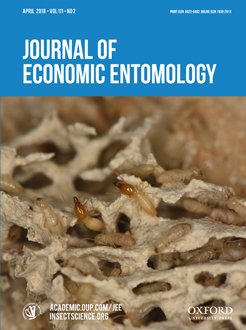Effects of mosquito control adulticides on sterile screwworm flies, Cochliomyia hominivorax (Coquerel) (Diptera: Calliphoridae), were investigated via bottle bioassays, outdoor cage tests, and exposure to treated vegetation. In bottle bioassays, 43 µg of permethrin via dilution of Evoluer, 474.56 µg of malathion via dilution of Fyfanon, and 25 µg of naled via dilution of Dibrom Concentrate were used to challenge screwworm flies. Permethrin was more toxic to screwworm flies than was malathion, which was more toxic than naled. On succeeding days, permethrin was still lethal to the flies, whereas malathion and naled were less toxic. During outdoor cage trials, screwworm mortality declined as distance from the spray truck increased. Sterile screwworm flies were killed by lower concentrations of permethrin needed to kill black salt marsh mosquitoes, Aedes taeniorhynchus (Wiedemann) (Diptera: Culicidae). Flies exposed to treated vegetation taken from the path of the spray cloud died more quickly than did flies exposed to leaves taken 5 ft inside the canopy. Fly mortality increased as volume mean diameter of droplets increased. In spite of the toxicity of Evoluer to screwworm flies, aspects of their biology make it unlikely that mosquito control operations would affect released flies.
How to translate text using browser tools
21 January 2018
Effects of Mosquito Control Adulticides on Sterile Cochliomyia hominivorax (Diptera: Calliphoridae)
Lawrence J. Hribar,
Heidi L. Murray,
Shaun G. McIntire,
Catherine A. Pruszynski
ACCESS THE FULL ARTICLE
It is not available for individual sale.
This article is only available to subscribers.
It is not available for individual sale.
It is not available for individual sale.

Journal of Economic Entomology
Vol. 111 • No. 2
April 2018
Vol. 111 • No. 2
April 2018
adulticide
bioassay
droplet
screwworm




